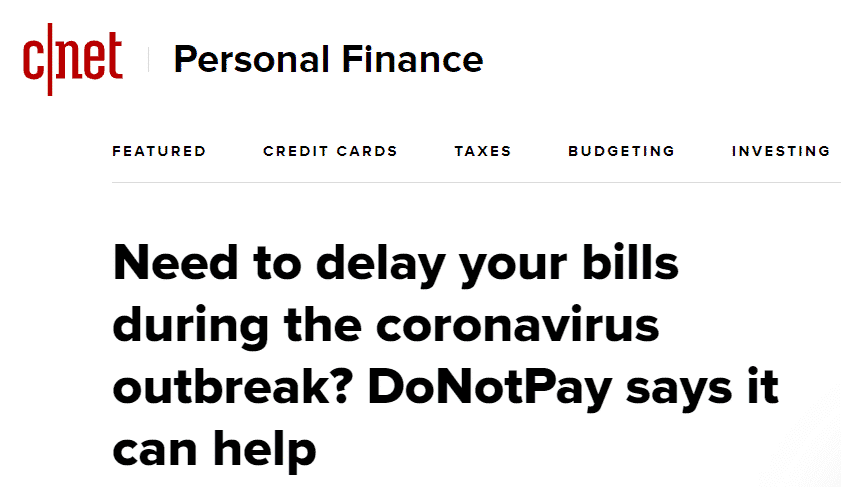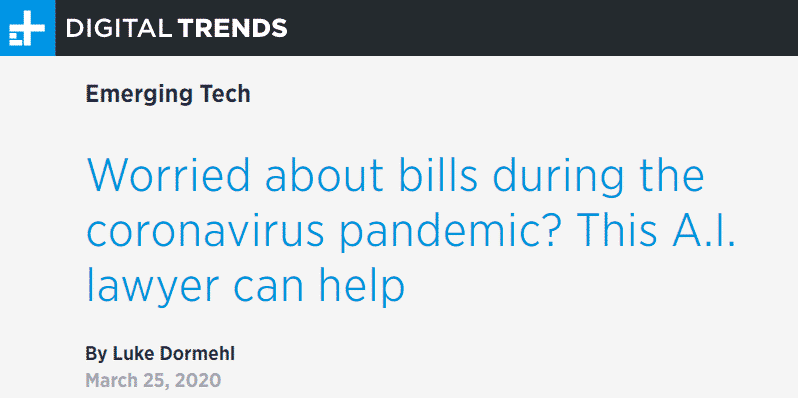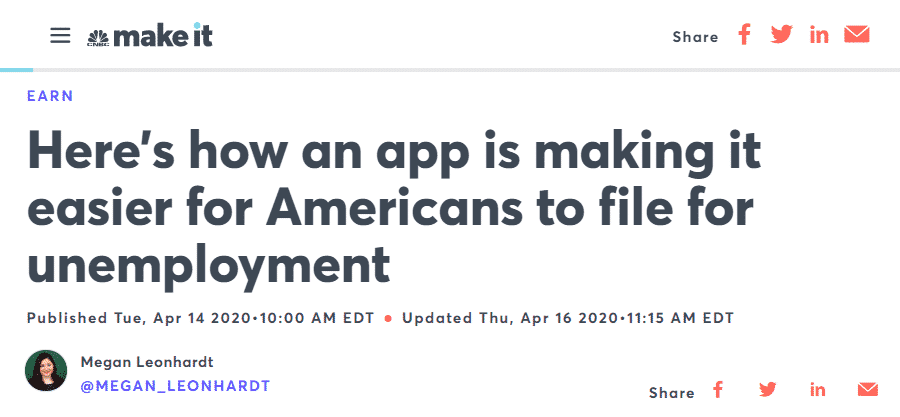Stressing over your student loan bill? DoNotPay is here to help!
We are in the midst of a severe student loan debt crisis. In the United States, 45 million people owe upwards of $1.5 trillion in student loan debt. In other words, student loan debt has become the second-largest consumer debt category in America!
Though the default repayment plan for federal borrowers requires you to pay off your debt within the next ten years, we wanted to let you know that there are ways to legally lower or even quit your student loan payments altogether.
These are the things we will be focusing on today, with the help of DoNotPay!
Save more on student loan bills with DoNotPay

While we were designing our app, ease-of-use was one of our top priorities. We knew that you would reach out to us in cases of emergency, so we wanted to make sure that you can navigate through the app fast and smoothly.
DoNotPay can help you with your student loan bills! All you have to do is:
- Access DoNotPay through a
- Click on the Corona Relief tab
- Let us know what type of service you want to get from us
- Provide us with some personal information
Given that transparency means the world to us, these are the personal information we will be asking you for:
- Your email address
- Your residential address
- Your full name
If you ask us to write a student loan postponement letter to your lender, we will need this information to make the letter personal.
Getting an extension date on your student loan bill

When times get rough, you are allowed to ask for an extension date on your student loan bills. As soon as you do this, the lender will temporarily put your account under administrative forbearance. To get an extension date on your bill, you would typically have to:
- Visit your lender in-person
- Call your lender
- Write an extension letter to your lender
Though all of these options are viable and relatively straightforward, they will take a good chunk of your time and energy.
The best way to avoid waiting in long queues is to write an extension date letter to your lender. But, you will not have to do it on your own because DoNotPay can write it for you!
We have become masters of writing extension letters over the years. If you want to secure the best possible outcome out of your request, there is no better way to do it than letting us write the letter for you. We will make sure that it is written in such a way that your lender understands your current financial situation and provides you with an extension date immediately!
This whole process can take up to 48 hours, but we will do our best to get it sorted much faster than that. Note that we have no power over how long the lender will take to send a response.
Negotiating your student loan settlements
In times of great financial hardships, feel free to negotiate your student loan bills with your lender. Everything in this world can be negotiated, and student loans are no exception. Keep in mind that you are not alone. Over one million federal student loan borrowers go into default and need to negotiate a settlement!
Student loan settlements are only possible if your account has reached the In Default status. Of course, you still have the option to approach your lender and ask to have your debt cut in half, but chances are, they will not agree to it. As long as you are paying your bills in due time, lenders will not consider negotiating a settlement!
These are the steps you need to take to reach a student loan debt settlement:
- Reach out to your lender with a debt settlement request
- Negotiate the settlement
- Pay the amount you agreed upon
Reaching out to your lender with a debt settlement request
As soon as your account reaches the In Default status, the lender will refer it to a collection agency. In case this happens, you should immediately reach out to your lender with a settlement request. One thing you will have to do in advance is to acquire the amount of money you are going to pay in advance for the settlement. There is a chance that your lender will allow you to cover the remaining balance in installments, but paying a certain amount in advance will be unavoidable.
Private loans are much easier to negotiate and get a better deal out of. Some borrowers ended up cutting their debt by 60% through negotiation. Make sure to be transparent with your lender by giving them an insight into your financial situation.
Negotiating the settlement
If you decide to negotiate your debt settlement, think about hiring a debt settlement company. You will not have to pay anything extra for their service, as they work for a percentage of the amount of money they manage to save you. These terms are almost exclusively settled on in advance, and you will not have to cover their fees until the debt is settled. You can do the negotiating on your own, but it would be safer to let the professionals do it if you want to secure a favorable outcome.
Paying the agreed-upon amount
When the negotiation is over, make sure to request the settlement in writing with all the dates and amounts included. If you are dealing with a federal government loan, you are probably going to have to pay the agreed-upon amount within 90 days. Private lenders are far more flexible, and with them, you can also negotiate not only the amount but whether you are going to pay the settlement in installments or a lump sum.
We understand that the whole process of negotiating a debt settlement can seem complicated and stressful. If you want to avoid the fuss and let us do the hard work for you, we will be more than willing to do it. It would be safe to say that our way is the least taxing way to approach this issue.
Ways to lower your student loan bills

We know that the idea of being debt-free might seem far-fetched to you right now, but, sooner or later, it will become a reality. In the meantime, you should focus on trying to lower your student loan bills until you get in a position to address your debt more aggressively. Here are the best options for tackling this issue:
| How to lower your student loan bills | What it entails |
| Refinancing your student loan | Refinancing your student loan is a great solution if you are a borrower of a private loan. The idea behind this is simple. You want to get a new loan from a private lender but with better terms and lower interest rates. That way, you can use the money from your new loan to pay off your debt while lowering your monthly installments. Federal loans should not be refinanced because you lose all types of federal protection, including deference, forbearance, and income-driven repayment plans. |
| Apply for an income-driven repayment plan | There are four different income-driven repayment plans.
|
| Settle for a graduated payment plan | This is a great option for those who know that their income will rise in the following years. Graduated payment plans mean that your monthly student loan installments start low and gradually increase over time. If you feel like you need more space right now to tackle other problems you are facing, settling for a graduated payment plan is the way to go. |
Getting a waiver on student loan bills

If you are struggling to make ends meet, we know that paying student loan bills months on end is the last thing you need. We wanted to let you know that, if you are in a bad financial place right now, you have a couple of options at your disposal that will allow you to defer your payments without going In Default:
| Type of postponement | What it entails |
| Student loan deferment | If you are going back to school, struggling to find a job, doing military service, student loan deferment might be the right option for you. All subsidized Stafford and consolidation loans will not accrue extra interest during the deferment period. This means that, when your deferment period expires, your balance will be the same as it was when deferment started. Keep in mind that unsubsidized Stafford loans, consolidation loans, PLUS loans, and SLS loans, will accrue additional interest during the deferment period. That is why it would be a good idea to at least cover the interest on your loan during this period. |
| Student loan forbearance | Unlike deferment, a student loan forbearance is a great option for those who are doing community service or working an internship. During forbearance, all types of loans will accrue additional interest. That is why the same rule applies to forbearance as it did for unsubsidized loans. Try to at least pay the interest on your loan during the grace period. It is worth mentioning that student loan forbearance immediately resolves any delinquencies on your account! |
Whichever option you decide to settle on, to get a waiver on your student loan bill you can :
- Visit your lender in-person
- Give a call to your lender
- Write a letter to your lender
- Consult an attorney
If you feel most comfortable talking to your lender over the phone, we would advise you to use our app to do so. Phone queues can go on forever, but with DoNotPay, you can skip them altogether!
Be that as it may, we want to highlight once again that sending a letter to your lender through our app would be the most efficient way to do this. Just open DoNotPay through a , and we will start working on your letter immediately.
All you will have to do is provide us with some personal information that we need to include in the letter, and the rest is on us. Please note that, while we will generate the letter in a matter of minutes, it might take a couple of days before your lender responds, and your waiver gets accepted.
Paying your student loan bills with a credit card
In general, this is not a viable option. Most organizations that collect student loan payments do not accept installments via credit cards. You can work your way around this, but whichever road you choose to go, you will end up paying even more money than you initially had to.
If you want to pay your student loan bill with a credit card, these are your options:
- Hire a third-party provider
- Get a cash advance
- Transfer your loan balance to a credit card
Paying your student loan bills through a third-party provider
One major downside of hiring a third-party provider is that you will have to pay a transaction fee each month. These fees vary depending on the provider, but you should expect to pay at least 2-3%. Overall, by choosing this option, you will increase the cost of your monthly student loan bills, which is not ideal.
Getting a cash advance for your student loan bills
This is the last thing you want to do. Your credit card provider can grant a cash advance on your credit line, which you can use to pay off your student loan bills. Keep in mind that, in this scenario, fees and interest rates can go through the roof, and exceed 25%! You should resort to this option only in situations of a dire emergency.
Transferring your loan balance to a credit card
Like all other previously mentioned options, this one will also increase your overall debt load. This option makes sense only if you qualify for a 0% APR transfer program. Since most people do not qualify for it, you should expect at least a 3% transaction fee added to your student loan payment.
What happens if you fail to pay your student loan bill in time?

If your worst-case scenario includes U.S. marshals knocking on your front door, we are sad to inform you that some people have had such experiences. Of course, the odds of something like that happening to you are fairly slim.
Consequences vary, depending on how late you are with your student loan bill payment:
- After 90 days, your loan gets classified as Delinquent
- After 270 days, your payment gets classified as In Default
Delinquent student loans
As you have probably imagined, if your payment is 90 days overdue, things start to get complicated. All three credit bureaus get a notice about your late payment, and your credit score takes a huge hit.
In case this happens to you, some serious repercussions might come your way. Keep in mind that future landlords and employers are going to check your credit score, and they will refuse your application based on your bad credit score.
In Default student loans
When your account gets classified as In Default, your lender turns your account over to a debt collection agency.
Not only will you have to pay your debt when the collection agency shows up at your door, but you will probably have to cover their money collecting fee as well. If you continue to ignore your student loan bills, the federal government will get involved. Among other things, they can get in contact with your employer and take a portion of your monthly paycheck.
DoNotPay’s many useful features
Since the very beginning, we knew that we wanted to create a platform that can make your life easier and less stressful, and we believe that we have achieved that. Apart from student loan bills, you can rely on DoNotPay for:
- Canceling subscriptions or memberships
- Fighting speeding tickets
- Getting revenge on robocalls
- Contesting parking tickets
- Helping with bills you are unable to pay
- Scheduling a DMV appointment fast and easy
- Disputing traffic tickets
- Getting refunds for delayed or canceled flights
 By
By